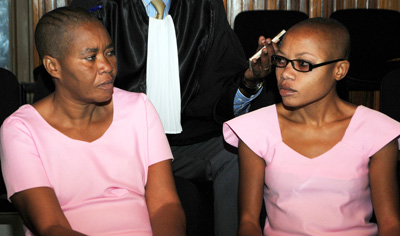Among the 232 journalists imprisoned around the world are Rwandan editors Agnès Uwimana and Saidati Mukakibibi, who are serving years-long terms on charges they defamed the president, Paul Kagame, and incited violence. Their crime? The women had published a series of stories in 2010 on several sensitive issues the Kagame government doesn’t want scrutinized. The articles criticized government agricultural policy, examined the July 2010 murder of journalist Jean-Léonard Rugambage, described the falling-out between Kagame and two now-exiled military leaders, probed divisions within the army, and pushed for justice for ethnic Hutus killed in the 1994 genocide. The editors have exhausted domestic appeals, but now a team of defense lawyers is pursuing a complaint with the African Commission on Human and People’s Rights on grounds that Rwanda violated its obligations to ensure freedom of expression and the right to fair trial.
CPJ Special Report
• Journalist imprisonments hit record high worldwide
“Rwandan courts never gave us justice,” Uwimana, editor of the Kinyarwanda-language bi-monthly Umurabyo, said in comments relayed to CPJ through a local contact who visited the editors in Central Prison in Kigali. Said deputy editor Mukakibibi: “I am punished for a crime I did not commit. It was clear that whatever evidence we gave fell on deaf ears.” Mukakibibi said the editors were “not prisoners of justice but prisoners of people who feared the truth behind our stories.”
While Umurabyo sometimes had a taste for the sensational, local journalists told me that it also raised important questions about public issues and provided an independent voice in a nation that, under Kagame, has few such news sources. Umurabyo closed after the two women were arrested in 2010, which critics say was the government’s intention in pursuing the prosecution.
The two were originally convicted on charges of divisionism and genocide denial, in addition to the defamation and incitement convictions; Uwimana was sentenced to 17 years, Mukakibibi to seven years. CPJ research shows that Rwandan authorities have a record of making highly charged accusations of genocide denial and divisionism against journalists who are critical of Kagame. Numerous news outlets have been forced to close and journalists have been driven into exile as a result. In April 2012, the Supreme Court tossed out the genocide and divisionism convictions and reduced Uwimana’s term to four years and Mukakibibi’s to three years.
The injustice, while diminished, remains profound, their lawyers say. The proceedings “left Agnès and Saidati guilty until proven innocent, which is in violation of the international right to a fair trial and in particular the right to the presumption of innocence,” said Nani Jansen, a lawyer with the Media Legal Defence Initiative, a London-based nonprofit that provides legal services for journalists. Jansen is part of a team that includes London attorney John Jones and Rwandan lawyers Evaliste Nsabayezu and Jean-Clause Mukikira.
The defense filed a complaint in October with the African Commission, which has agreed to hear the case, Jansen said. The complaint alleges local authorities violated their obligations to ensure free expression and fair trial as guaranteed by the African Charter on Human and People’s Rights, which Rwanda ratified in 1983. The commission could recommend the editors’ release and other remedies, including financial compensation. Jansen said that while the commission’s rulings are not binding, a decision in favor of the editors would “send a clear signal to the Rwandan government and hopefully set a positive precedent for other journalists in the country who are prosecuted for simply doing their job.”
Imprisonment has taken only a toll not only on the editors, both of whom are single parents, but on their families as well. “Living in prison is like a living hell. You can spend a month without seeing sunshine,” Uwimana said. Perhaps the hardest part, though, is being away from her youngest child, who is 5. “My son is still too young to be without parents and to understand the situation,” Uwimana said. “Sometimes I feel like I am a bad mother.” Mukakibibi said her family has struggled to pay school fees for her children. Her teenage daughter has had to take responsibility for the entire family. “It’s a big challenge taking responsibility for 15 people,” she said, one that entails scuffling to pay the bills and dealing with crises such as roof damage caused by heavy rains.
Yet both women say they plan to continue their professional work upon their release. “I will go back to journalism if we get a license again,” Mukakibibi said. “Or, failing that, I will work as a freelancer.”
